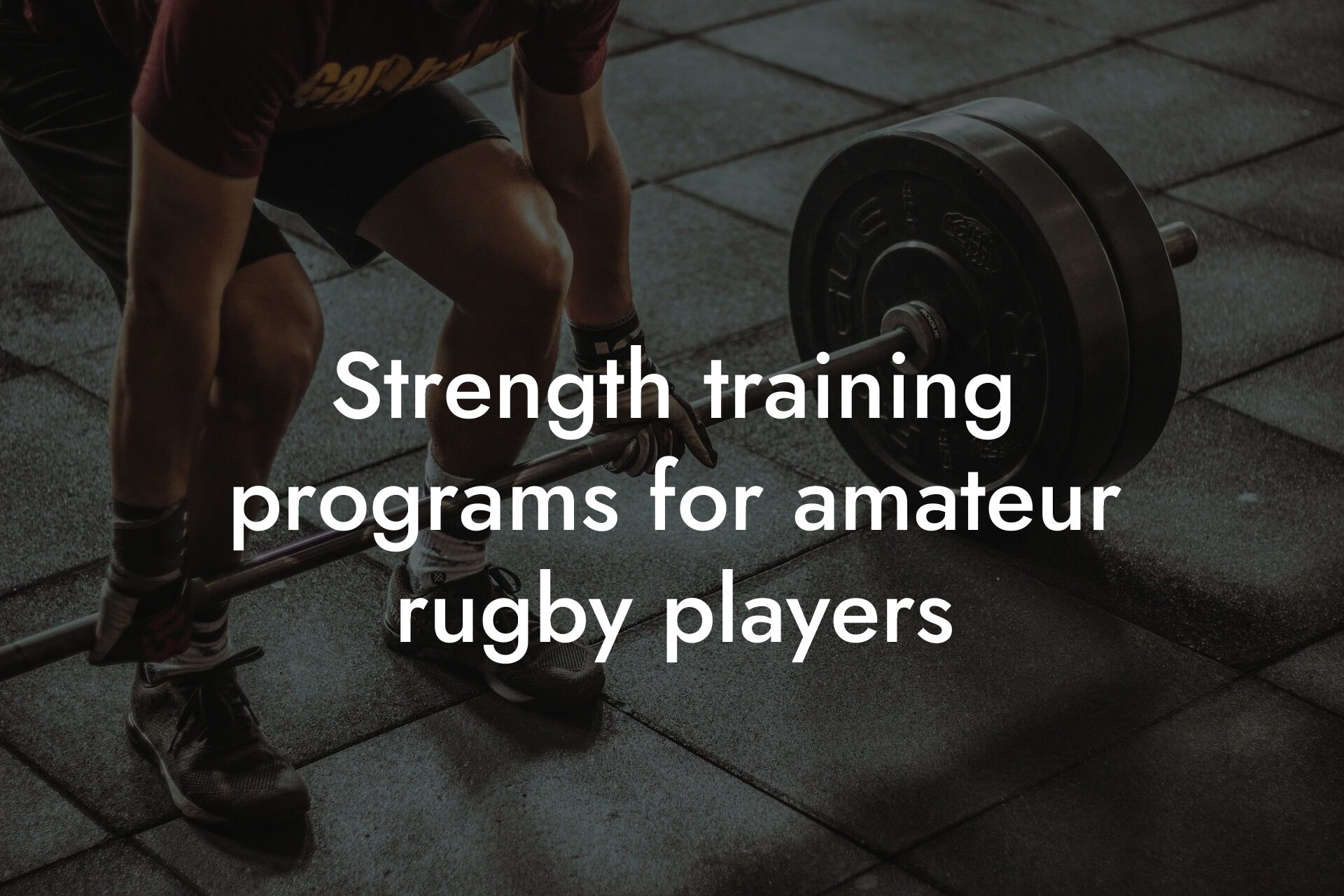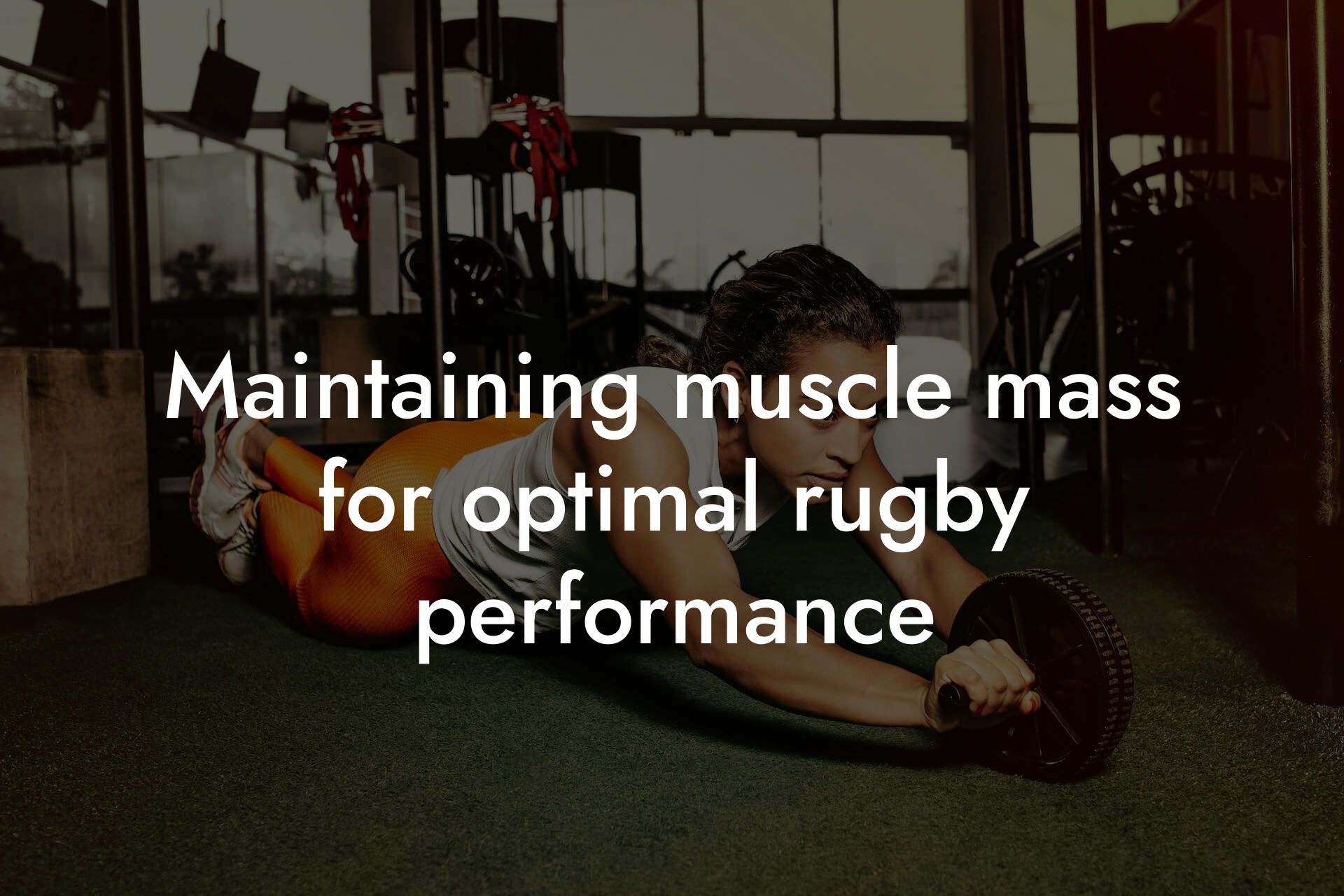As a rugby athlete, you know that the physical demands of the sport can be intense. The intense physicality, high-impact collisions, and grueling training sessions can take a toll on your body. After a match, it's essential to prioritize recovery to ensure you're ready for the next game. At Tano Performance Group, we understand the importance of optimal recovery strategies to enhance performance, reduce injury risk, and improve overall physical well-being. In this article, we'll delve into the most effective recovery strategies for rugby athletes after matches.
Table of Contents
- Immediate Post-Match Recovery (0-30 minutes)
- Nutrition and Supplementation (0-2 hours)
- Active Recovery (2-24 hours)
- Sleep and Relaxation (2-24 hours)
- Massage and Manual Therapy (2-48 hours)
- Cryotherapy and Heat Therapy (2-48 hours)
- Recovery Monitoring and Tracking
- Individualization and Periodization
- Frequently Asked Questions
Immediate Post-Match Recovery (0-30 minutes)
The first 30 minutes after a match are critical for recovery. During this period, your body is in a state of heightened inflammation, and your muscles are most receptive to nutrient uptake. Focus on the following strategies:
1. Hydration: Drink 1-2 liters of water or a sports drink to replenish lost fluids and electrolytes. Aim to consume 150-200% of your body weight in fluids within the first 30 minutes.
2. Cooling Down: Perform a gentle 10-15 minute cool-down, consisting of light cardio and dynamic stretching to reduce muscle soreness and promote blood flow.
3. Compression Garments: Wear compression clothing, such as tights or sleeves, to improve blood flow and reduce muscle oscillation.
Nutrition and Supplementation (0-2 hours)
Within the first 2 hours after a match, focus on replenishing energy stores, reducing inflammation, and promoting muscle repair:
1. Carbohydrate Intake: Consume 1-1.5 grams of carbohydrates per kilogram of body weight to replenish glycogen stores. Opt for simple carbohydrates like sports drinks, fruit, or energy bars.
2. Protein Intake: Consume 20-30 grams of protein to stimulate muscle protein synthesis and repair. Choose a source of protein with a high bioavailability, such as whey protein or eggs.
3. Anti-Inflammatory Supplementation: Consider adding anti-inflammatory supplements like omega-3 fatty acids, turmeric, or ginger to reduce inflammation and promote recovery.
Active Recovery (2-24 hours)
Active recovery techniques can help promote blood flow, reduce muscle soreness, and enhance recovery:
1. Light Swimming or Cycling: Engage in low-intensity swimming or cycling to promote blood flow and gentle muscle activation.
2. Foam Rolling and Self-Myofascial Release: Use a foam roller or your own body weight to release tension in your muscles and improve circulation.
3. Gentle Stretching: Perform gentle, static stretches to improve flexibility and range of motion.
Sleep and Relaxation (2-24 hours)
Adequate sleep and relaxation are crucial for recovery. Ensure you:
1. Get 7-9 hours of sleep to allow your body to repair and adapt.
2. Establish a relaxing pre-sleep routine, such as reading or meditation, to reduce stress and promote relaxation.
Massage and Manual Therapy (2-48 hours)
Massage and manual therapy can help reduce muscle soreness, improve circulation, and promote recovery:
1. Sports Massage: Receive a sports massage from a qualified therapist to target specific areas of tension and promote recovery.
2. Self-Massage: Use self-massage techniques, such as trigger point therapy, to release tension in your muscles.
Cryotherapy and Heat Therapy (2-48 hours)
Cryotherapy and heat therapy can help reduce inflammation, improve circulation, and promote recovery:
1. Ice Baths: Immerse yourself in an ice bath (10-15°C) for 10-15 minutes to reduce inflammation and muscle soreness.
2. Contrast Showers: Alternate between hot and cold water in the shower to improve circulation and reduce inflammation.
3. Heat Therapy: Apply heat packs or use a warm bath to promote relaxation and reduce muscle spasms.
Recovery Monitoring and Tracking
To optimize recovery, it's essential to monitor and track your progress. Use the following metrics to assess your recovery:
1. Heart Rate Variability (HRV): Track your HRV to monitor your body's stress response and recovery.
2. Subjective Feedback: Monitor your perceived exertion, muscle soreness, and overall fatigue to adjust your recovery strategies.
3. DEXA Scans: Utilize DEXA scans to track changes in body composition, bone density, and muscle mass.
Individualization and Periodization
No two athletes are alike, and recovery strategies should be tailored to individual needs. Consider the following factors when developing your recovery plan:
1. Training Phase: Adjust your recovery strategies based on your training phase, such as pre-season, in-season, or off-season.
2. Playing Position: Tailor your recovery strategies to your specific playing position, as different positions have unique physical demands.
3. Injury History: Adapt your recovery strategies to accommodate any existing injuries or chronic conditions.
By incorporating these recovery strategies into your post-match routine, you'll be better equipped to handle the physical demands of rugby, reduce your risk of injury, and optimize your performance. Remember to stay hydrated, fuel your body with the right nutrients, and prioritize rest and relaxation to ensure you're ready for the next match. At Tano Performance Group, we're committed to helping you achieve your performance goals through cutting-edge body assessment and personalized coaching. Contact us to learn more about how our DEXA scans and expert guidance can take your game to the next level.
Frequently Asked Questions
What is the importance of recovery strategies for rugby athletes after matches?
Recovery strategies are crucial for rugby athletes after matches as they help to reduce muscle soreness, repair damaged tissues, and replenish energy stores. This enables athletes to return to training and competition sooner, with improved performance and reduced risk of injury.
What are the common symptoms of fatigue in rugby athletes after matches?
Common symptoms of fatigue in rugby athletes after matches include muscle soreness, stiffness, decreased strength, and reduced endurance. Athletes may also experience mental fatigue, characterized by decreased concentration, motivation, and mood disturbances.
What is the role of nutrition in recovery strategies for rugby athletes?
Nutrition plays a critical role in recovery strategies for rugby athletes. Consuming the right foods and fluids within 30-60 minutes after a match can help to replenish energy stores, repair damaged tissues, and reduce muscle soreness. Focus on consuming carbohydrates, protein, and healthy fats.
What are the best foods for rugby athletes to consume after a match?
The best foods for rugby athletes to consume after a match include bananas, dates, protein shakes, chocolate milk, and meals rich in carbohydrates and protein such as pasta, rice, and lean meats. Aim to consume 15-30 grams of protein and 30-60 grams of carbohydrates within 30-60 minutes after a match.
How much fluid should rugby athletes consume after a match?
Rugby athletes should aim to consume 17-20 ounces of fluid for every pound of body weight lost during a match. This can be achieved by drinking water, sports drinks, or other electrolyte-rich beverages.
What is the role of stretching and foam rolling in recovery strategies for rugby athletes?
Stretching and foam rolling can help to reduce muscle soreness, improve flexibility, and promote blood flow to damaged tissues. Focus on static stretches that hold the muscle in a lengthened position for 20-30 seconds, and use foam rolling to target specific areas of tension.
How often should rugby athletes stretch and foam roll after a match?
Rugby athletes should aim to stretch and foam roll within 30-60 minutes after a match, and then again 24-48 hours later. This can help to reduce muscle soreness and improve recovery.
What is the role of compression garments in recovery strategies for rugby athletes?
Compression garments can help to improve blood flow, reduce muscle soreness, and promote recovery. They work by applying graduated compression to the affected area, which can help to reduce swelling and promote the removal of waste products.
How long should rugby athletes wear compression garments after a match?
Rugby athletes should wear compression garments for at least 2-3 hours after a match, and ideally for 24 hours or more. This can help to promote recovery and reduce muscle soreness.
What is the role of cryotherapy in recovery strategies for rugby athletes?
Cryotherapy, such as ice baths or cold water immersion, can help to reduce muscle soreness, inflammation, and improve recovery. It works by constricting blood vessels, reducing metabolic rate, and promoting the removal of waste products.
How long should rugby athletes use cryotherapy after a match?
Rugby athletes should use cryotherapy for 10-15 minutes at a time, with a temperature of 10-15°C (50-59°F). This can be repeated for 2-3 sessions, with 30-60 minutes of rest in between.
What is the role of sleep in recovery strategies for rugby athletes?
Sleep is critical for recovery in rugby athletes, as it allows the body to repair and adapt to the physical demands of the sport. Aim for 7-9 hours of sleep each night, and prioritize good sleep hygiene practices such as maintaining a consistent sleep schedule and creating a relaxing sleep environment.
How can rugby athletes improve their sleep quality after a match?
Rugby athletes can improve their sleep quality by establishing a relaxing bedtime routine, avoiding caffeine and electronics before bedtime, and creating a dark, quiet sleep environment. Aim to go to bed within 1-2 hours after a match, and prioritize good sleep hygiene practices.
What is the role of mental recovery strategies in rugby athletes?
Mental recovery strategies, such as meditation, visualization, and positive self-talk, can help to reduce mental fatigue, improve mood, and promote recovery. They can also help to improve focus, concentration, and overall performance.
How can rugby athletes incorporate mental recovery strategies into their routine?
Rugby athletes can incorporate mental recovery strategies into their routine by setting aside dedicated time for relaxation and recovery, using guided meditation apps or videos, and practicing positive self-talk and visualization techniques.
What is the role of massage therapy in recovery strategies for rugby athletes?
Massage therapy can help to reduce muscle soreness, improve flexibility, and promote recovery. It works by increasing blood flow, reducing muscle spasms, and promoting the removal of waste products.
How often should rugby athletes receive massage therapy after a match?
Rugby athletes should aim to receive massage therapy within 24-48 hours after a match, and ideally 2-3 times per week. This can help to promote recovery and reduce muscle soreness.
What is the role of active recovery in recovery strategies for rugby athletes?
Active recovery, such as light cardio or swimming, can help to promote blood flow, reduce muscle soreness, and improve recovery. It can also help to maintain cardiovascular fitness and reduce the risk of injury.
How often should rugby athletes engage in active recovery after a match?
Rugby athletes should aim to engage in active recovery within 24-48 hours after a match, and ideally 2-3 times per week. This can help to promote recovery and reduce muscle soreness.
What is the role of nutrition supplements in recovery strategies for rugby athletes?
Nutrition supplements, such as protein powder and creatine, can help to promote recovery and improve performance. However, they should be used in conjunction with a balanced diet and not as a replacement for whole foods.
What are the best nutrition supplements for rugby athletes?
The best nutrition supplements for rugby athletes include protein powder, creatine, and branched-chain amino acids (BCAAs). These can help to promote recovery, improve performance, and reduce muscle soreness.
How can rugby athletes ensure they are getting enough protein after a match?
Rugby athletes can ensure they are getting enough protein after a match by consuming protein-rich foods such as lean meats, fish, eggs, and dairy products. They can also use protein powder as a supplement to their diet.
What is the role of antioxidants in recovery strategies for rugby athletes?
Antioxidants, such as vitamins C and E, can help to reduce oxidative stress and inflammation, and promote recovery. They can be found in foods such as fruits, vegetables, and nuts, and can also be taken as supplements.
How can rugby athletes incorporate antioxidants into their diet?
Rugby athletes can incorporate antioxidants into their diet by consuming antioxidant-rich foods such as fruits, vegetables, and nuts, and by taking supplements such as vitamins C and E.
Here are some related articles you might love...
- Strength training programs for amateur rugby players
- Using DEXA scans to optimize rugby training
- Maintaining muscle mass for optimal rugby performance
- Nutrition strategies for sustaining energy during rugby matches
- How to optimize endurance and power in rugby
- The role of body composition in rugby performance
- Reducing body fat for better agility and power in rugby
- Off-season conditioning for amateur rugby players
- Bone density and injury prevention in rugby
Zak Faulkner
Zak Faulkner is a leading authority in the realm of physical health and body composition analysis, with over 15 years of experience helping professionals optimise their fitness and well-being. As one the experts behind Tano Performance Group, Zak has dedicated his career to providing in-depth, science-backed insights that empower clients to elevate their physical performance and overall health.
With extensive knowledge of DEXA technology, Zak specializes in delivering comprehensive body assessments that offer precise data on body fat, muscle mass, bone density, and overall physique. His expertise enables individuals to make informed decisions and achieve their fitness goals with accuracy and confidence. Zak’s approach is rooted in a deep understanding of human physiology, combined with a passion for helping clients unlock their full potential through personalised strategies.
Over the years, Zak has earned a reputation for his commitment to excellence, precision, and client-focused service. His guidance is trusted by top professionals who demand the best when it comes to their health. Whether advising on fitness programs, nutritional strategies, or long-term wellness plans, Zak Faulkner’s insights are a valuable resource for anyone serious about taking their health and fitness to the next level.
At Tano Performance Group, Zak continues to lead our Content Team revolutionising how professionals approach their physical health, offering unparalleled expertise that drives real results.




